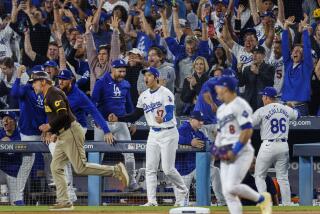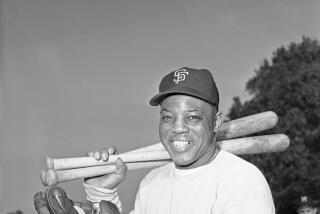Going by the book: No juice, but plenty of pulp
Just for the record, Roy Hobbs struck out.
The preternaturally gifted ballplayer Robert Redford played on film in âThe Naturalâ made it onto The Timesâ sports section front Sept. 20, in a mostly tongue-in-cheek article theorizing that olâ Roy wasnât all he was cracked up to be -- as many fans now suspect of certain contemporary record-smashing sluggers famed for their amazing expanding physiques or their suspiciously shrunken congressional testimonies.
Deep beneath Hobbsâ heroic exploits, our article speculated, lay concealed a seedy secret now commonly attributed to McGwire and Sosa, to Ankiel and Bonds. To wit, he was a juicer. No, it wasnât just god-given sinew and eye-hand coordination that launched that climactic shot into the stadium lights, sending Redford into a home run trot beneath a fireworks display of exploding bulbs. Chemical assistance helped him cream the pitch and clear the bases, and that was the guilty little secret behind Hollywoodâs signature home run.
But the article was mistaken to suspect hidden chicanery. Hollywood is ever so much more brazen than that.
Redford and director Barry Levinson didnât create Roy Hobbs. Bernard Malamud did, in the 1952 novel âThe Natural,â and he wasnât interested in movie heroics. In hindsight, this exceedingly dark and hard-bitten book could have been a warning about Bonds and BALCO and a whole lot more that sours the sporting scene and society at large.
Hobbsâ Hollywood homer propelled the downtrodden New York Knights into the World Series, and set up the hero for an honorable early discharge: He went directly into retirement, having dared and triumphed in one last crucial playoff game, despite the life-threatening reopening of an old bullet wound in his belly. We last see him as a gentleman farmer, playing catch with his son under the beaming eye of Glenn Close, the good woman whoâd stood as his beacon when corrupting evil had beckoned in the form of gamblers blandishing cash and Kim Basinger.
Malamudâs Hobbs is another piece of work. Heâs a conflicted, angry loner who didnât get enough love as a child, whoâs not that bad a sort, really, and has principles, but who tends to undermine his best intentions and best interests. Heâs blinded by an egotistical need to break every hitting record, and by a tendency to swing whenever a good-looking woman makes a pitch a little less than belt-high. Heâs ultimately undone because when the woman who truly could save him turns up, he takes an intentional walk. Unlike Basingerâs character, Memo Paris, the worthy Iris Lemon is a tad too thick around the rump and thighs, and a grandma at 33. Roy reckons that such a mate would make him feel prematurely old. Adios, sweetheart.
Later, like many of us, Hobbs vacillates when the big decision is at hand: Does he take Memo and the money and throw the playoff (itâs Memo, more than the money, that he wants), or does he give it an honest effort? Pretzeled by conflicting desires, he tries to have it both ways: two tanked at-bats for Memo and the bookies, then a moral switcheroo after a chance encounter with an imploring Iris in the grandstand. He tries to win, but too late: All he can muster is two honest strikeouts with the game on the line. As he leaves the ballpark (after avenging himself on the bookies with his fists), Roy meets a paperboy hawking the first headlines about his sellout.
âSay it ainât true, Roy.â
âWhen Roy looked into the boyâs eyes he wanted to say it wasnât but couldnât, and he lifted his hands to his face and wept many bitter tears.â
Thatâs the ending Redford and Levinson couldnât abide, because itâs their job to sell tickets, and as they and their producers knew, âThe Naturalâ would have grossed peanuts without the homer and the fireworks, the heroic uplift and the warm afterglow. They know the American public, and after a hundred years of celluloid fantasy and sporting myth, many of us are not conditioned to accept tragedy or disturbing ambiguity until they come hammering into our own lives. Maybe not even then. And certainly not on our leisure time.
You and I, weâve been through this together. The McGwire-Sosa home run duel of â98? Bonds invincible in 2001 and 2002? They felt like a thrill and a privilege, and bless the stars who made it so. There already were murmurs about steroids, before-and-after pictures of Bonds and Bonds-plus, but it was easy to dismiss an unproven allegation in favor of more palatable explanations: that we were witnessing marvels made possible by advances in nutrition, training and sports medicine, combined with the expansion-fueled dilution of big-league pitching and a perhaps more lively post-players-strike baseball. Nothing insidious. Nothing to spoil the thrill.
âWhen is Roger Maris going to hit his home run?â That was me, September 1961, age almost 6, last day of the season at Yankee Stadium. My little-boy self thought we were there to see not an attempt, but a performance, a fait accompli. My memory: a sudden forest of adults springing from seats and filling the wedge of grass and sky under an overhanging grandstand; a lift from Dad, and a glimpse of Maris waving near the dugout, then gone. Expectations of heroism, fulfilled.
âHe was a throwback to a time of true heroes . . . a natural not seen in a dogâs age, and werenât they the lucky ones [that] he had appeared here and now to work his wonders before them?â Thatâs Malamud, describing Roy Hobbsâ admiring public, and describing we lovers of latter-day home-run heroics, before the fall.
What I take from âThe Naturalâ is that decent enough people can give in to temptation; that they repeat mistakes instead of learning from them; that the fear of appearing to be vulnerable, flawed and old is a damaging fear of whatâs unavoidably human; that wonders ever cease; and that this is all very sad. Malamud is writing about the human condition, not just about baseball. Heâs asking us to stop demanding fantasy, and to understand -- and maybe to forgive -- the truth. We built up McGwire, Sosa and Bonds because they fulfilled our childish fantasies; if and when conclusive proof comes, many will scorn them with the commensurately vindictive wrath of overgrown kids who let themselves be conned. But if the worst turns out to be true, what were these sluggers doing but trying to cheat a reality that neither they, nor most of their public, knew how to face? If they wrote a false script by putting make-believe in their bloodstreams, wasnât it to thrill and satisfy we who already had make-believe in ours?
Many commentators on the career of Willie Mays, Barry Bondsâ godfather and my boyhood hero (tied with Tom Seaver), have a common take on his last season, 1973, when he batted .211 for the Mets, and ended not with a triumphant home run, but with a costly stumble and fall while going for a fly ball in center field against the Aâs during the World Series.
They have a tisking tone: Didnât Mays know that he never should have played on with such diminished skills? How could he let us down by contradicting what he had been? How could he cloud our conception of heroism as mastery, as human limits mocked and defied?
Here are Iris and Roy, talking -- Malamudâs version. She goes first.
âI hate to see a hero fail. There are so few of them. . . . Without heroes, weâre all plain people and donât know how far we can go.â
âYou mean the big guys set the records and the little buggers try and bust them?â
âYes, itâs their function to be the best and for the rest of us to understand what they represent and guide ourselves accordingly.â
He hadnât thought of it that way but it sounded all right.
âThere are so many young boys you influence.â
âThatâs right,â said Roy.
âYouâve got to give them your best.â
âI try to do that.â
âI mean as a man too.â
Willie Mays, a man, was giving his best on that October day when he fell and muffed the ball, and though I wish he had caught it, his missing teaches us something we need to know, if weâre willing to face it: that itâs just human to be flawed and to fail. Scorn the honest twilight of Willie, and you sow seeds for the dubious, unnaturally extended prime of Bonds. Turn your back on the flawed, failed Roy Hobbs of Malamud, replace him with a creature of sentimentalized fantasy, tailored for a public that would rather be soothed with childrenâs stories, and youâve done your bit to make it a tad easier for people to lose touch with âhow far we can go.â
If there is no limit to the ends we desire athletes to achieve, why complain about some of the means they use? Which Roy Hobbs would you choose -- the idealized one who brings down the stadium lights? Or the painfully real one whose last swings, his honest best, wonât bring redemption for the all-too-human mess he has made?
--
More to Read
Go beyond the scoreboard
Get the latest on L.A.'s teams in the daily Sports Report newsletter.
You may occasionally receive promotional content from the Los Angeles Times.











